Over the years, our water bill seems to have got progressively higher and I think I accepted the increases thinking that it was something I had little control over.
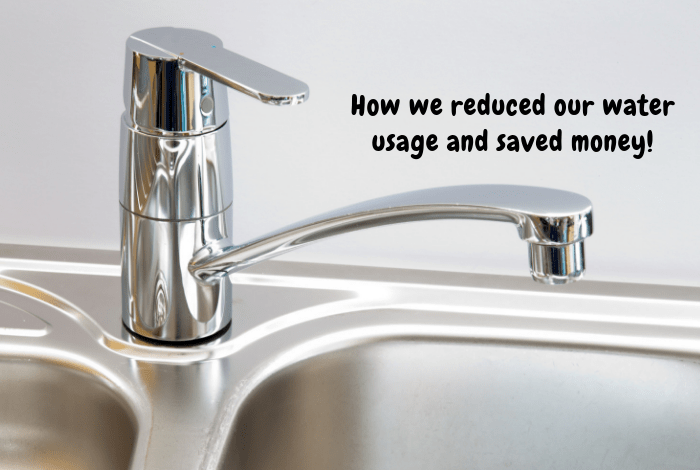
Don’t get me wrong, I did a few of the obvious things to reduce the water we use (no hosepipe use, only washing a full load, no dishwasher, water saving devices in the toilets are the main changes) but it never really made much of a difference to the amount we were charged on our bill so I just continued as we were and accepted that our bill was always going to be a bit higher than I would have liked it to be.
Then in August we got a letter from the water company putting our monthly payments up to £46 which is made up of £42 a month that they estimate we’ll use and £4 extra that we need to catch up as we used more water than expected in the previous six months (our water company only bill every six months now).
I did some research and it seems that the average water bill for a family of four in our area is £37 which is a little bit less than we pay. Not a huge amount of difference but if I’m honest, I would have expected us to be below average thanks to the steps we’d already taken so I started to think about where we else we could cut back to try and reduce our water bill.
You might have seen in a recent five frugal things post that I found out that my local water company do an amazing little kit that helps save water in all sorts of ways – and it’s completely free! I ordered one and when it came, I made some changes based on the things we’d been sent.
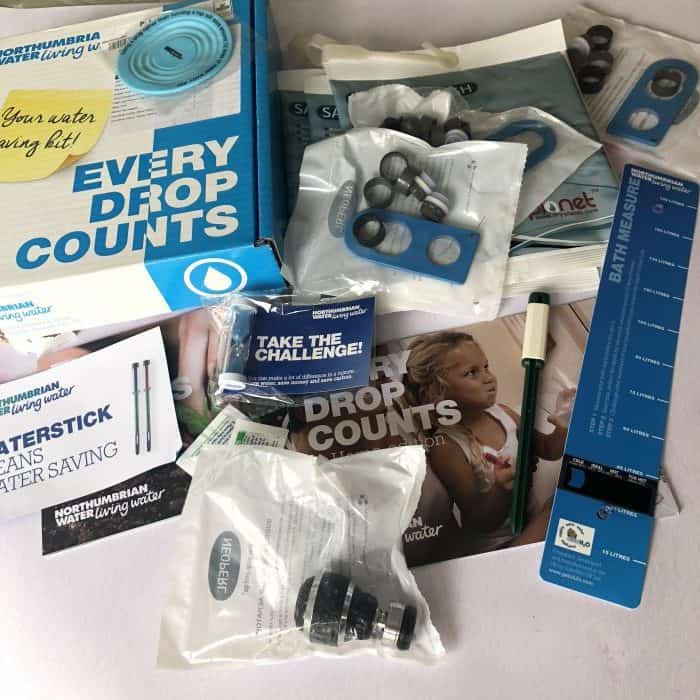
The savings in £ below are based on the fact that my water company charge a set amount per cubic meter for both water usage (124.68p) and sewerage (120.39p). A cubic metre equates to 1000 litres so for every 1000 litres of water I save over the year, I’ll save around £2.45. I’m not the sort to work out savings in such detail usually but for the purposes of this post, I unleashed my inner geek,
Also, you’ll notice from the first three savings I’m sharing that we clearly weren’t anywhere near as efficient as I thought we were – hence the reason for this post. I figured if I thought I was doing OK and clearly wasn’t then some of you might be in the same position!
Reduce water usage in the bath
I really enjoy a bath in the morning before work as it’s such a nice relaxing way to start what’s no doubt going to be a stressful day. Using the water level measure that I got with the kit, I measured how much water I use in an average bath (I already knew this would be way too much) and was a bit shocked to discover that there were around 12o litres in there.
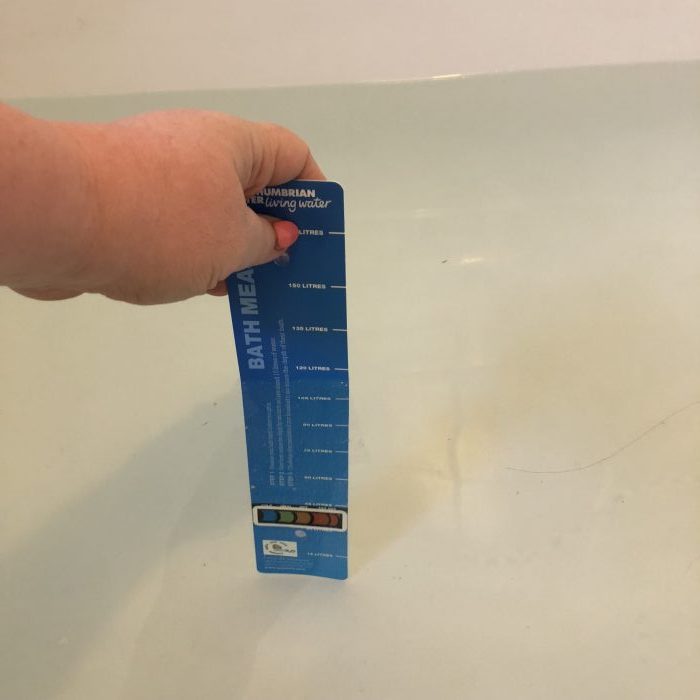
So I changed my morning routine and instead of having a bath every day Monday to Friday and one on a weekend I now have a bath every second day which saves around half of the water that I use. And even then, apart from my weekend bath when I like to hibernate in there with bubbles and a book, I’ve started using less water in my bath. This means that where I was using up around 720 litres of water a week just in baths, I’m now using around half that. That’s a saving of around 18,720 litres a year and in terms of cold hard cash – that’s £45.81 which is one whole month’s payments.
Reducing water usage in my greenhouse
I’ve only just got started with the whole greenhouse growing thing and was pretty late to the game this year so I only had some tomato plants, a chill plant and some strawberries in a grow bag but even then I was using at least one – two watering can’s worth of water most days in the Summer. That’s around 1o litres a day so in theory, if I was going to be watering daily next year over a longer period with more plants meaning more water would be needed then that’s a lot of water I’ll be using.

It’s really difficult to calculate the savings here because I have no idea how often I’ll be watering when I start next year and how much water I’ll use when I have more plants but I’ve ordered a water butt for my garden so I can water from that and not the tap instead. I’ll even use it for washing the car hopefully – or at least the kids will!
I also got a cool little water tester stick in my free kit that will tell me if my plants actually need watering which is brilliant for a novice gardener like me!
Reducing water usage in the shower
I’m not a shower person at all but both kids like a quick shower most nights which is all good but Miss Frugal can sometimes get lost in there and dissappear for a good while. According to the information I got with my kit, reducing the time in the shower by just one minute can save up to £30 per person per year so if I can get her to come down to a five-minute shower most nights then that’s going to have a big impact on our bills.
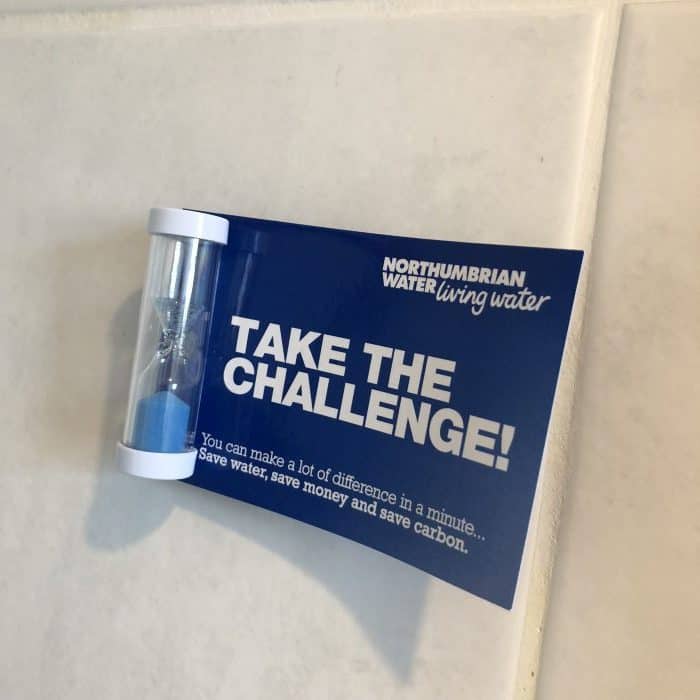
We now have a cool little shower time on the wall to give her an idea of how long she’s been in there for and although I don’t think we’ll get her down to five minutes every shower, getting her down from 15 to 10 minutes will save £150 a year just on her alone.
Those are my three big hitters when it comes to the things we’ve done to reduce our water usage but there are a couple of other things we’ve done to make sure we’re being as efficient as possible:
- Check for drips – A dripping tap could waste 26 litres of water a day.
- Not letting the water run while we brush our teeth – Turning off the tap saves up to 6 litres of water wach time.
- Use save a flush bags – we have little bags in our toilet cisterns that mean it uses less water to fill each time they’re flushed.
- When we bought our washing machine, we chose an eco-friendly one with a half wash cycle. We try and only use it when we have a full load but if we don’t then we use the half load option.
- We have a tap that you have to run for a while to get nice cold water so rather than do that, I have a bottle in the fridge that I fill with water and use that instead.
Other things to avoid
There’s a couple of things we don’t do but you might that I also wanted to mention:
- A pressure washer uses about 400 litres of water an hour which is a HUGE amount.
- A hosepipe uses about 170 litres of water every 20 minutes which again adds up massively if you use it to water your garden. 10 minutes a night every day in August, for example, works out to more than 2500 litres.
- Only run your dishwasher on a full load unless you have half load or eco load options.
Don’t miss out on future posts like this – receive updates directly to your inbox by email by adding your email address here and hitting subscribe. You can also follow me on Twitter, BlogLovin or Networked Blogs and I’d love to see you over on my Facebook page and on Instagram. You can find out more about me here.
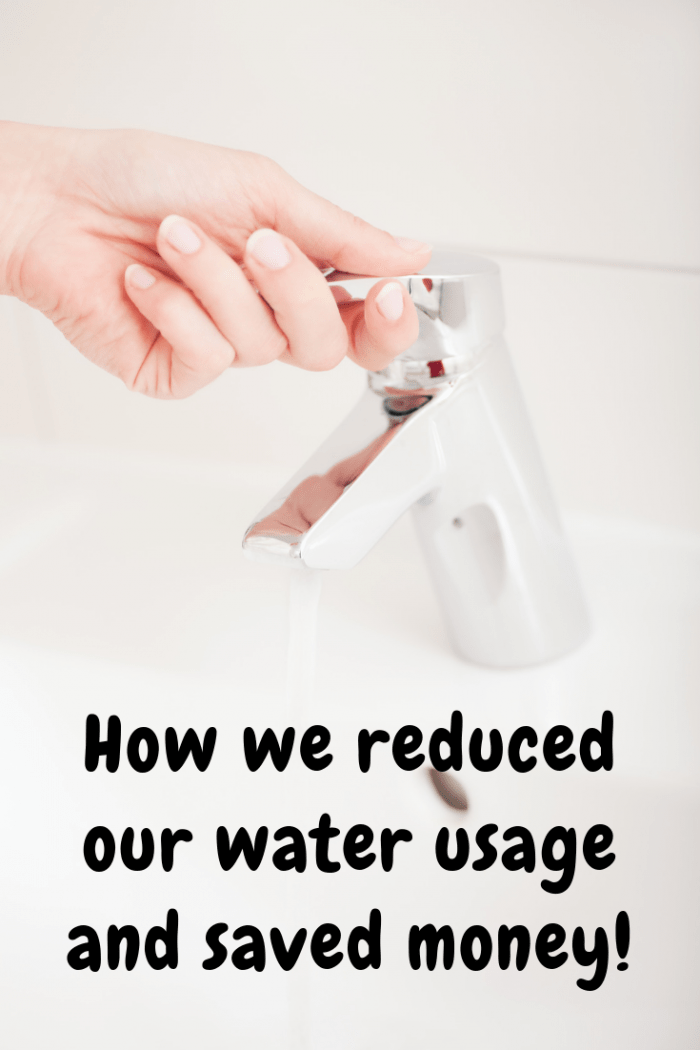






 Logging you in...
Logging you in... Loading IntenseDebate Comments...
Loading IntenseDebate Comments...

moneybeagle 52p · 335 weeks ago
Danielle Ogilve · 334 weeks ago